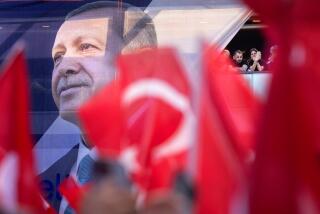A Country That Needs Tough Love
- Share via
President Clinton will again welcome one of the world’s worst human-rights abusers to the White House today. The prime minister of Turkey, Mesut Yilmaz, will be seeking military aid and political comfort, which Clinton is likely to provide. For his own good, however, Yilmaz should instead be getting a stern lecture from the president.
Last Saturday, Turkey got a jarring tongue-lashing from the European Union as it was rejected in its bid for membership, in part because of its dismal human rights record. It was also chastised at last week’s Islamic summit in Iran for its growing military alliance with Israel. More isolated than ever, Ankara is desperate for friends.
While not wholly appreciated, Turkey has been an important ally of the United States. At the intersection of many U.S. interests--mainly oil from the Persian Gulf and Caspian Sea--it has long been a friendly Muslim country in a tough region that includes Iran, Iraq, Syria and Russia.
For that reason, the United States has regarded Turkey as a key military partner for 45 years. Turkey rose to be the third-largest recipient of U.S. military aid in the 1980s, and has been the world’s major importer of arms, most of them American, in the 1990s. We helped Turkey build the largest force in NATO, next to our own, including hundreds of fighter jets, dozens of military helicopters and more than 2,000 tanks and combat vehicles. In doing so, Washington greatly enhanced the stature of the already powerful Turkish military.
The rationale for this largess is Turkey’s “bad neighborhood.” But to Turkey’s generals, the bad neighborhood is its own southeast, the traditional homeland to 15 million Kurds, where a small guerrilla force has been battling the army since 1984. The rebels seek some political autonomy, plus the right to use the Kurdish language freely, a goal supported by a majority of Kurds even as they deplore the violence of the conflict. The cost of this civil war is severe: 28,000 are dead and more than 2 million Kurds made homeless by the army’s policy of emptying villages to deny the rebels a base of support.
The war is taking a heavy toll on Turkey. Kurdish refugees pour into cities like Istanbul and are recruited to political Islam. The rise of an Islamic party, which held power for one year before the military forced it out in June, is partly attributable to the war’s ravages. Meanwhile, Turkish citizens who question the war policy are routinely prosecuted. Strictures on the press, religion and assembly, numerous reports of torture and a climate of intimidation persist. The economy is beset by hyperinflation and heavy debt; its rejection by the European Union can be counted as only the latest casualty of war.
Washington scarcely acknowledges this ongoing debacle. Clinton aides were quoted this week saying that the president would allow the sale of as much as $5 billion in attack helicopters to Turkey if it shows progress on human rights; but other reports said the Pentagon was “prevailing” in favor of the sale with or without such conditions. Only the State Department’s human rights bureau seems dismayed by Turkey’s repeated violations. Willful ignorance reigns elsewhere. President Clinton and the secretary of state have never publicly uttered a word of concern about the Kurds’ mistreatment or Turkey’s human rights meltdown.
But the belief in Washington that Turkey, in exchange for such succor, will be a loyal enforcer of U.S. policy is mistaken. Ankara has supported Saddam Hussein’s incursions into Kurdish northern Iraq and presses for sanctions on Iraq to end. Turkey trades freely with Iran, despite U.S. disapproval. It has been bitterly contentious in the Caucasus, disrupting aid to Armenia and reportedly helping to arm Chechen rebels. Its bumptious relations with Greece are a wearying source of tension for the entire Eastern Mediterranean.
Prime Minister Yilmaz will argue for more military aid and political support on the ground that Turkey is vital to American policy in that troubled region. But what we really need is a democratic Turkey that fully respects political rights. As its strongest ally and major trading partner, the U.S. could help Turkey by pressing for a political settlement of Kurdish grievances and no-nonsense protection of human rights. Turkey, in fact, would be the major beneficiary of such a change. That is the message the president should convey today.
More to Read
Sign up for Essential California
The most important California stories and recommendations in your inbox every morning.
You may occasionally receive promotional content from the Los Angeles Times.












